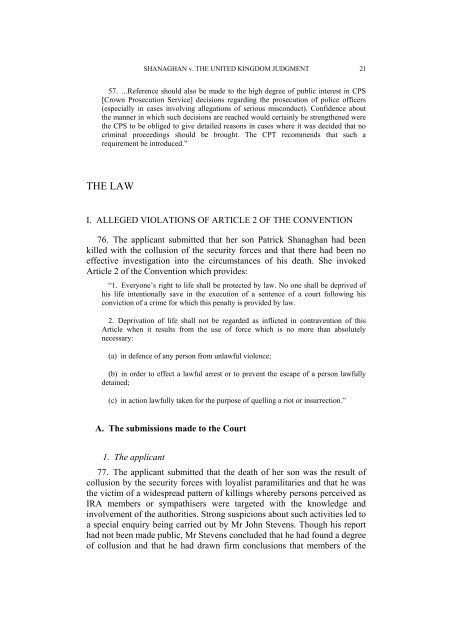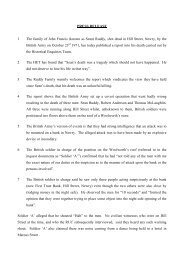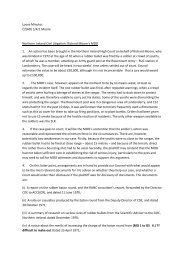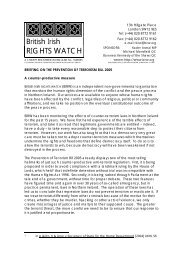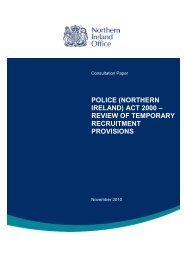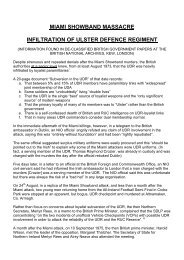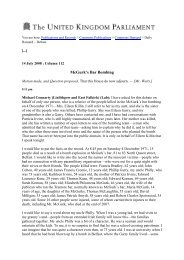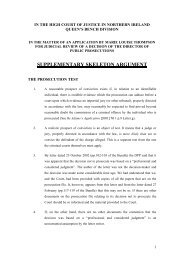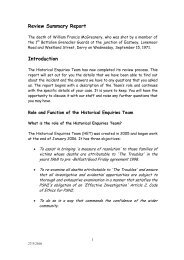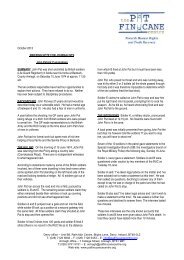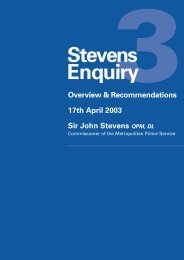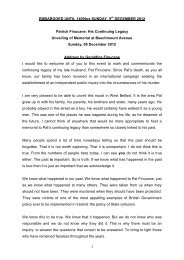Patrick Shanaghan v the United Kingdom - The Pat Finucane Centre
Patrick Shanaghan v the United Kingdom - The Pat Finucane Centre
Patrick Shanaghan v the United Kingdom - The Pat Finucane Centre
Create successful ePaper yourself
Turn your PDF publications into a flip-book with our unique Google optimized e-Paper software.
SHANAGHAN v. THE UNITED KINGDOM JUDGMENT 21<br />
57. ...Reference should also be made to <strong>the</strong> high degree of public interest in CPS<br />
[Crown Prosecution Service] decisions regarding <strong>the</strong> prosecution of police officers<br />
(especially in cases involving allegations of serious misconduct). Confidence about<br />
<strong>the</strong> manner in which such decisions are reached would certainly be streng<strong>the</strong>ned were<br />
<strong>the</strong> CPS to be obliged to give detailed reasons in cases where it was decided that no<br />
criminal proceedings should be brought. <strong>The</strong> CPT recommends that such a<br />
requirement be introduced.”<br />
THE LAW<br />
I. ALLEGED VIOLATIONS OF ARTICLE 2 OF THE CONVENTION<br />
76. <strong>The</strong> applicant submitted that her son <strong><strong>Pat</strong>rick</strong> <strong>Shanaghan</strong> had been<br />
killed with <strong>the</strong> collusion of <strong>the</strong> security forces and that <strong>the</strong>re had been no<br />
effective investigation into <strong>the</strong> circumstances of his death. She invoked<br />
Article 2 of <strong>the</strong> Convention which provides:<br />
“1. Everyone’s right to life shall be protected by law. No one shall be deprived of<br />
his life intentionally save in <strong>the</strong> execution of a sentence of a court following his<br />
conviction of a crime for which this penalty is provided by law.<br />
2. Deprivation of life shall not be regarded as inflicted in contravention of this<br />
Article when it results from <strong>the</strong> use of force which is no more than absolutely<br />
necessary:<br />
(a) in defence of any person from unlawful violence;<br />
(b) in order to effect a lawful arrest or to prevent <strong>the</strong> escape of a person lawfully<br />
detained;<br />
(c) in action lawfully taken for <strong>the</strong> purpose of quelling a riot or insurrection.”<br />
A. <strong>The</strong> submissions made to <strong>the</strong> Court<br />
1. <strong>The</strong> applicant<br />
77. <strong>The</strong> applicant submitted that <strong>the</strong> death of her son was <strong>the</strong> result of<br />
collusion by <strong>the</strong> security forces with loyalist paramilitaries and that he was<br />
<strong>the</strong> victim of a widespread pattern of killings whereby persons perceived as<br />
IRA members or sympathisers were targeted with <strong>the</strong> knowledge and<br />
involvement of <strong>the</strong> authorities. Strong suspicions about such activities led to<br />
a special enquiry being carried out by Mr John Stevens. Though his report<br />
had not been made public, Mr Stevens concluded that he had found a degree<br />
of collusion and that he had drawn firm conclusions that members of <strong>the</strong>


